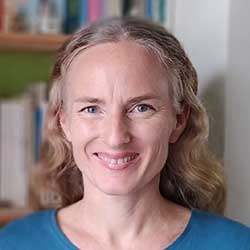-
ML-102
Modern European Film: Themes and Perspectives
This module explores themes of metamorphoses and adaptation in six contemporary European films. Each film depicts transformative human experiences, significant events that can be seen as rites of passage in various stages of people's lives. The module also introduces methods by which such experiences are represented through the medium of film. The films selected for this module are in French, German, Italian, and Spanish, and are all subtitled.
-
ML-180
Introduction to Studying Languages for Business Students
This module is an introduction to language learning for business students enrolled onto the languages¿ pathway. The students will take part in taster sessions for each language offered at beginner¿s level and will gain insight into business related matters of countries in which the languages are spoken. In addition, the students will receive training in language learning techniques, terminology, and intercultural awareness.
-
ML-203
Modern European Film
This module explores themes of metamorphoses and adaptation in six contemporary European films. Each film depicts transformative human experiences, significant events that can be seen as rites of passage in various stages of people's lives. The module also introduces methods by which such experiences are represented through the medium of film. The films selected for this module are in French, German, Italian, and Spanish, and are all subtitled.
-
ML-320
Modern Languages Dissertation Preparation
This module introduces you to the practice of research and dissertation writing in the field of Modern Languages and will guide you in the first part of your dissertation preparation.
Areas covered include: selecting a relevant topic, asking relevant research questions, preparing and writing up a literature review, preparing and writing up a research proposal, research methods and library research tools, making use of foreign-language sources, structuring your dissertation, analysis and argumentation, compiling a bibliography.
In addition to lectures and seminars, you will have three meetings with your supervisor. By the end of the module you will have developed your dissertation topic, know what methodology you will use and have acquired knowledge of how to organise and lay out your dissertation.
Assessment for the module consists of a literature review, a research proposal and a presentation.
-
ML-321
Modern Languages Dissertation
This module provides students with the opportunity to research one aspect of French, German, Italian or Hispanic culture in detail, and to present the findings of their research in a dissertation of 8000 words.
The module will be taught by means of four practical seminars on research and writing skills, and through three formal supervision sessions with a dissertation supervisor. Your supervisor will help you to find a topic, suggest research strategies, agree a suitable title, discuss the structure of your dissertation, and will read closely and comment on one draft chapter. The topic may relate to a module you are doing at Level 3, provided that this does not involve a duplication of material and is agreed with the module coordinator in advance.
The dissertations may be written in English, in your target language, or in Welsh (where Welsh-medium provision is available).
-
ML-M20
Language, Translation and Interpreting Research Skills
This module introduces students to the practice of postgraduate research and dissertation writing in the field of Modern Languages, Translation and Interpreting, and will guide them in the first part of their dissertation preparation. Students will be thoroughly trained to write a dissertation proposal and will gain enhanced domain-focused research skills that are key for a successful MA dissertation. Should they later decide to advance to a PhD level, they will also be on a very good standing with their advanced language and translation research skills gained through this process.
-
MLF220
Paris
The capital city of France is renowned as the capital of the nineteenth century, the arts and modernity. This module will introduce you to the unique cultural environment of Paris, and you will analyse its evolution from the nineteenth century to the present day. The main focus of the module will be the images of the city as mediated in fiction, art and iconography, architecture, music and film. The module explores the changing urban environment in Paris and its adjacent suburbs, from Baron Haussmann's controversial infrastructure projects in the nineteenth century, to the post-war construction of the HLM in the banlieues, to the twentieth-first century. The module will also examine the reputation of Paris as the capital of romance and its contemporary status as a multicultural metropolis.
-
MLT207
Dialogue Interpreting
This module, which builds on the introduction to Interpreting provided in Year 1 by MLT100 Concepts in Translation and Interpreting, will develop practical strategies and techniques for performing Dialogue Interpreting between parties who do not speak each other's language, as well as oral translation of relevant documents at sight. There will typically be a mixture of short lectures on relevant aspects of Interpreting Theory (especially professional ethics), live bilingual and multilingual scenarios, and language laboratory practical sessions in preparation for assessment. The assessment will be two Sight Translations, one in each direction (40%) and one Dialogue Practical Class Test (both directions) in the Lab (60%). A wide range of materials will be available on Blackboard to practice sight translation and interpreting in your own time.
-
MLT330
Interpreting - Local Government Option
This module will develop strategies and techniques to perform sight translation and dialogue (or bilateral consecutive) interpreting in the context of Local Government, covering a selection of topics in the areas of council services, social services, environmental health, and education. There will be lectures/workshops on voice confidence, note-taking, and ethics, and practical sessions (live sessions and language laboratory sessions using the latest technology) to enhance your learning. A range of materials will be made available on Canvas to practice the different modes of interpreting in your own time.
This module will also prepare you for the Diploma in Public Service Interpreting, examined by the Chartered Institute of Linguists (CIoL). This is optional and takes place in June every year (registration by February; CIoL fee applies).
-
MLTM07
Healthcare Interpreting
In this module you will develop strategies and techniques to perform Simultaneous Whispering Interpreting (SI/WI) and Dialogue Interpreting (DI) (including some Telephone Interpreting (TI), plus an opportunity to try Sight Translation (ST)).
The module covers a selection of topics from the following areas: the structure of the NHS and the equivalent national health services in the countries where the languages you study are spoken; various conditions and diseases (eg. of the circulatory, digestive, respiratory, reproductive, and urinary systems) - their symptoms, diagnosis and prognosis; mental health.
There will be a mixture of interactive lectures on interpreting theory, ethics, and practice, plus live sessions, and language laboratory practical sessions.
The assessment is an in-class test in the language laboratory (100%).
A wide range of materials will be available on Canvas to aid practice of the different modes of interpreting in your own time.
This module will also help prepare you for the Diploma in Public Service Interpreting (Health), examined by the Chartered Institute of Linguists (CIoL). This is optional and takes place in June / November (registration by April / October, CIoL fee applies).


